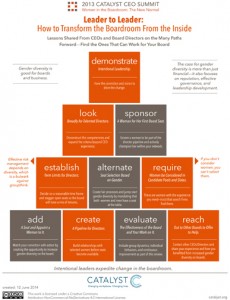By Catalyst
The United States is one of the most diverse countries in the world. Our diversity is a strength that leads to innovation and ingenuity. US corporate boards should be tapping into that strength by recruiting qualified women and minority directors with varied talents, backgrounds, and perspectives.
Unfortunately, most of them are not. This problem is hardly unique to the United States; women’s underrepresentation on boards is a global phenomenon. However, the United States is rapidly falling behind other economic leaders such as France and the United Kingdom. South African women currently enjoy better representation on boards than their US counterparts.
Several pervasive myths continue to impede women’s progress in this area, including the myths that CEO experience is required for board service, that there are too few qualified women to narrow the gender gap, and that women are already entering corporate leadership at a pace that will eventually eliminate the gender imbalance. But Catalyst research shows this simply isn’t true: You don’t need CEO experience to sit on a board; there are plenty of well-qualified women out there; and, given the current rate of change, women will not achieve parity by sitting around and waiting for it.
So how can senior leaders with the power to make change wield that power most effectively? Catalyst’s CEO Summit yielded a number of important insights from F500 CEOs and senior leaders who are doing just that. Here are some practical tips:
- Demonstrate intentional leadership. Don’t just talk about change; set measurable goals, establish meaningful timelines, and follow through.
- Cast a wider net. Talented directors come from a variety of backgrounds.
- Sponsor a talented woman (or two or three!) you believe in, and help her succeed.
- Insist on diverse candidate slates, and mandate that both women and men have seats at the table.
 Diverse boards enhance public trust by representing the interests of a company’s many stakeholders, from its shareholders and suppliers to its employees, customers, and the residents of the communities in which it operates.
Diverse boards enhance public trust by representing the interests of a company’s many stakeholders, from its shareholders and suppliers to its employees, customers, and the residents of the communities in which it operates.
Corporate boards in the United States and around the world must make a conscious effort to capitalize on the strength diversity can bring, as many have already begun to do. Their overall financial performance and global economic competitiveness depend on it.
————-
Founded in 1962, Catalyst is the leading nonprofit organization expanding opportunities for women and business. With offices in the United States, Canada, Europe, India, and Australia—and more than 700 members—Catalyst is the trusted resource for research, information, and advice about women at work. Catalyst annually honors exemplary organizational initiatives that promote women’s advancement with the Catalyst Award.






